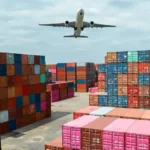- By TOP CHINA FREIGHT
- October 13, 2025
- Shipping
Table of Contents
When it comes to what documents needed for food products from China to UK, importers must navigate strict safety standards and documentation requirements. The UK food import process involves health certificates, customs paperwork, and compliance checks to ensure food safety and traceability. This guide explains each necessary document, logistics procedures, and proven techniques to simplify your import process while avoiding costly delays or penalties.

What Are the Main Documents Needed for Food Products from China to UK?
To import food products successfully, every shipment must be backed by precise documentation. UK customs and the Food Standards Agency (FSA) require evidence of product safety, origin, and handling. Below is a list of the key documents required for food imports.
| Document Name | Purpose | Issued By | Required For |
|---|---|---|---|
| Commercial Invoice | Declares product value and transaction details | Exporter | All shipments |
| Packing List | Details packaging and product contents | Exporter | All shipments |
| Bill of Lading / Airway Bill | Confirms shipment ownership and route | Carrier | All shipments |
| Certificate of Origin | Verifies country of manufacture | Chamber of Commerce | Most food products |
| Health Certificate | Ensures food meets safety standards | CIQ / Export authority | All edible goods |
| Import License | Authorizes import of restricted food items | UK Port Health Authority | Regulated foods |
| Phytosanitary Certificate | Certifies plant-based products are pest-free | CIQ | Fruits, vegetables, grains |
| Veterinary Certificate | Certifies animal-derived foods are safe | Animal Quarantine Dept. | Meat, dairy, seafood |
| Customs Declaration (C88) | Legal entry document for UK imports | Importer or agent | All shipments |
Why Are These Documents So Important for UK Food Imports?
Verify HS codes to ensure correct tariff application.
The China Entry-Exit Inspection and Quarantine Bureau issues food safety and health certificates.
Register each item’s quantity, weight, and batch code.
Labels must include ingredient list, allergens, expiration dates, and English translation.
Professional forwarders ensure all documentation aligns with UK import laws.
What Customs Procedures Apply to Food Imports into the UK?
Once your shipment reaches a UK port, it undergoes several checks before being released for sale.
| Procedure | Description | Timeframe |
|---|---|---|
| Pre-Notification | Importer submits IPAFFS entry | 24 hours before arrival |
| Documentary Check | Verification of certificates and invoices | 1–2 days |
| Identity Check | Visual check on packaging and labeling | 1 day |
| Physical Inspection | Sample testing for contaminants | 1–3 days |
| Customs Clearance | Release after all checks | Within 24 hours post-approval |
Moreover, food shipments arriving by sea freight often require an additional cold chain verification process to ensure temperature stability, especially for seafood or meat.
How to Ensure Food Safety Compliance from China to UK
Compliance is not only about paperwork—it’s about traceability and product integrity. Importers should maintain a digital record of:
- Batch numbers
- Supplier registration data
- Product testing certificates
- Transport temperature logs
The UK’s Food Standards Agency (FSA) can audit these records at any time. Therefore, a good strategy is to implement a Supplier Verification Program (SVP)—a system that tracks supplier history, quality control, and inspection frequency.
Which Shipping Methods Work Best for Food Products?
Food logistics must balance cost, time, and temperature control. Each method has advantages depending on the product type.
| Method | Transit Time | Best For | Pros | Cons |
|---|---|---|---|---|
| Air Freight | 5–8 days | Perishable items | Fast, reliable, low contamination risk | Expensive |
| Sea Freight | 25–40 days | Bulk dry or canned goods | Economical, scalable | Slower, temperature-sensitive |
| Rail Freight | 18–25 days | Processed or packaged foods | Balanced cost/time | Limited routes |
| Courier / Express | 3–6 days | Samples or small batches | Simple clearance | Higher cost per kg |
Case Study: Successful Import of Processed Food from Shenzhen to London

A UK importer of packaged noodles worked with a Chinese manufacturer in Shenzhen. The exporter provided all required documents:
- CIQ Health Certificate
- Commercial Invoice and Packing List
- Certificate of Origin
- Pre-declaration via IPAFFS
By coordinating customs documentation 5 days before the container’s arrival and booking an inspection slot in advance, clearance was completed within 36 hours, avoiding demurrage fees and enabling on-time supermarket delivery.
How to Reduce Delays During UK Food Customs Clearance
Delays often occur due to missing or incorrect paperwork. To prevent this:
- Double-check certificate validity (especially Health and Phytosanitary Certificates).
- Match labeling details with customs entries.
- Use bonded warehouse clearance to shorten inspection waiting time.
- Pre-pay import VAT and duties online via Customs Declaration Service (CDS).
- Partner with a food-specialized freight forwarder familiar with both CIQ and UK Border Force regulations.
Additionally, consolidating documents into a single digital folder (PDF or EDI format) helps customs officers process your shipment more efficiently.
How Much Does It Cost to Import Food Products from China to UK?
Cost depends on product type, weight, and shipping mode. Below is a general estimate:
Other costs include customs duty (0–12%), import VAT (20%), and inspection fees (varies by port).
Conclusion
Importing food products from China to the UK requires precise documentation and adherence to regulatory standards. Understanding what documents needed for food products from China to UK helps importers ensure faster customs clearance, maintain product integrity, and avoid penalties. By preparing key certificates in advance, coordinating with reliable freight forwarders, and complying with IPAFFS and FSA regulations, your food imports can flow smoothly and profitably.
Need a Shipping Quote?
If you want expert guidance and peace of mind, our team is ready to assist.
TJ China Freight offers tailored solutions to help businesses of all sizes ship more reliably from China.

FAQ
Q1: Do I need a health certificate for all food imports from China?
Yes. Every food product must have a health certificate issued by Chinese CIQ authorities confirming it meets hygiene and safety standards for UK import approval.
Q2: Can I import fresh vegetables from China to the UK?
Yes, but a Phytosanitary Certificate is required to confirm the goods are pest-free and meet EU-equivalent plant health rules.
Q3: How long does UK customs take for food shipments?
Typically 2–5 days depending on inspection requirements. Pre-declaration through IPAFFS can shorten clearance to under 48 hours.
Q4: Do I need to register with the UK Food Standards Agency?
Yes. Importers of food products must register their business with the FSA before placing goods on the market.
Q5: Can I use express couriers for small food samples?
Yes, couriers like DHL or FedEx can handle food samples under simplified customs, but restricted items still need certification.




